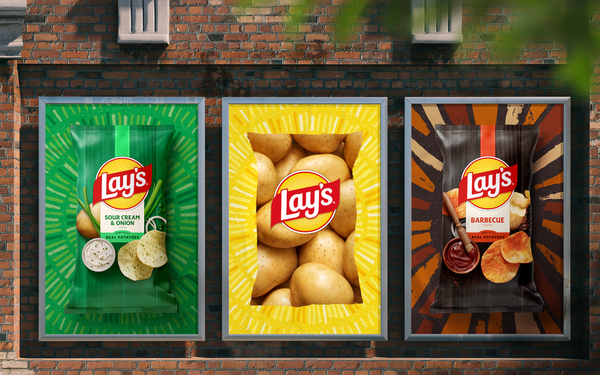
PepsiCo is putting its chips on
change. With its North American food sales down 3% and activist investors pressing for sharper performance, the company is rolling out what it calls the most significant global transformation in
Lay’s 90-year history—a rebrand built around a simple but surprising insight: 42% of consumers don’t know the iconic chips are made from real potatoes.
The overhaul includes
new packaging, warmer colors, and sun-ray graphics that highlight the potato’s journey “from farm to bag.” The company has been developing that story line for months now, starting
with the launch of the brand’s charming “Little Farmer” spot, which first aired on the Super Bowl. Each
bag also proclaims: "Made with Real Potatoes." By the end of 2025, all core Lay’s products in the U.S. will be made without artificial flavors or colors, with updates to its Baked and Kettle
Cooked lines following in 2026.
advertisement
advertisement
“The new visual identity celebrates the humble, farm-grown potato—where every Lay’s chip starts,” said Alexis Porter, PepsiCo’s
vice president of global marketing for Lay’s, in the announcement. “It’s a love letter to our origins.”
The change is PepsiCo’s latest response to two tsunamis
rocking its snack business. First, sales are slipping as cost-conscious shoppers trade down or do without—and investors, including Elliott Investment Management, which has built a $4 billion
stake, are demanding faster growth and even exploring a breakup of the company’s food and beverage divisions.
Second, the company faces a different kind of pressure: The “Make
America Healthy Again” movement, which includes millions of consumers and an administration pushing food makers to clean up ingredient lists, phase out dyes, and make transparency a core
value.
In remarks prepared for investors, CEO Ramon Laguarta said the company is “aggressively prioritizing faster organic revenue growth” by fueling its core and removing
artificial colors and flavors across the portfolio. The Frito-Lay and Quaker divisions, now grouped as PepsiCo Foods North America, have been cutting costs, closing plants, and trimming SKUs to regain
traction in what Laguarta called “a subdued environment for packaged food.”
At the same time, PepsiCo is expanding its $2 billion “permissible” portfolio of
better-for-you snacks—brands like Simply, Siete, Sun Chips, and Sabra—to meet what it sees as the next frontier in value: food that feels cleaner without losing flavor. Sun Chips has
become the top-selling “permissible” salty-snack brand, and Siete has logged double-digit growth this year.
For Lay’s, the refresh is more than cosmetic. The company is
introducing new oils such as olive and avocado, promoting faster farm-to-factory turnaround times—sometimes as little as 48 hours—and weaving the transparency message through every bag
design. That “farm-to-bag” positioning is meant to win back shoppers increasingly skeptical of mass-market snacks and to underline PepsiCo’s answer to the clean-label wave reshaping
grocery aisles.
For a legacy brand built on nostalgia, it’s forward-looking move—and a critical one. “We are working with a high sense of urgency,” executives told
analysts on the earnings call. If the new Lay’s identity can make real potatoes feel modern again, it might just help steady PepsiCo’s footing in a category that’s getting tougher by
the bite.